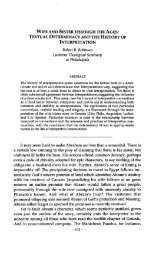FROM EXEGESIS TO HERMENEUTICS - Rice School of Pastoral ...
FROM EXEGESIS TO HERMENEUTICS - Rice School of Pastoral ...
FROM EXEGESIS TO HERMENEUTICS - Rice School of Pastoral ...
Create successful ePaper yourself
Turn your PDF publications into a flip-book with our unique Google optimized e-Paper software.
Schneiders: From Exegesis to Hermeneutics 39The third model, the hermeneutical, <strong>of</strong>fers some possibilities that anexclusively exegetical model does not. But it also places heavy demandsand responsibilities on the Catholic biblical scholar. In this model theinterpreter is not permitted to stop short with what the ancient authorsaid but must wrestle with the impact <strong>of</strong> what was said upon today'sfaith. The exegete, in other words, must become both spiritually maturebeliever and adequately trained theologian. 58 He or she must face theresponsibility <strong>of</strong> really interpreting the biblical text, not just decipheringan ancient document. But, to do this, the biblical scholar must not onlybe allowed the freedom to apply appropriate methods <strong>of</strong> research andreport neutral data, but also must be respected in the exercise <strong>of</strong> ecclesiallyresponsible theological and pastoral initiative within the commontradition. Biblical scholars, if they are to be prophetic servants <strong>of</strong> theWord in the Church and not just impassive academic valets bringing outthe dusty papers from the family archives, must become full partnerswith theologians and pastors in the exercise <strong>of</strong> the Church's teachingmission.Conversely, theologians must become sufficiently able in the biblicaldisciplines that they can enter into the process <strong>of</strong> interpretation <strong>of</strong> thebiblical scholars and not just pick up the latters' conclusions. Andpastors must learn to contribute to this collaborative project their ownexperience and concerns. They must learn to formulate the speculativequestions from a pastoral perspective and surface the practical implications<strong>of</strong> academic proposals without claiming to teach what they do notunderstand or substituting the exercise <strong>of</strong> <strong>of</strong>ficial authority for the realauthority <strong>of</strong> learning and compassionate love. 59 In short, the teachingministry <strong>of</strong> the Church, it seems to me, must cease to be a fragmentedoperation <strong>of</strong> competing experts attempting to fence <strong>of</strong>f their own sphere<strong>of</strong> influence, and become a cooperative service <strong>of</strong> fully and equallyparticipating members who strive to enhance and enlarge each other'scontribution while trying to improve the quality <strong>of</strong> their own. Such aministry would not only call the members <strong>of</strong> the Christian community tothe table <strong>of</strong> the Word, but prepare that table with the nourishment thatproduces mature sharers in the mission <strong>of</strong> preaching the Gospel to everycreature.58 1 have argued this position at length in a paper entitled, "Freedom: Response andResponsibility—The Vocation <strong>of</strong> the Biblical Scholar in the Church," which will bepublished in the forthcoming volume <strong>of</strong> the Proceedings <strong>of</strong> the Villanova TheologyInstitute, 1981.59 An excellent treatment <strong>of</strong> the relationship <strong>of</strong> knowledge to teaching and both toauthority in the Church can be found in B. Cooke, Ministry to Word and Sacraments(Philadelphia: Fortress, 1976), pp. 405-521, esp. pp. 513-20.



